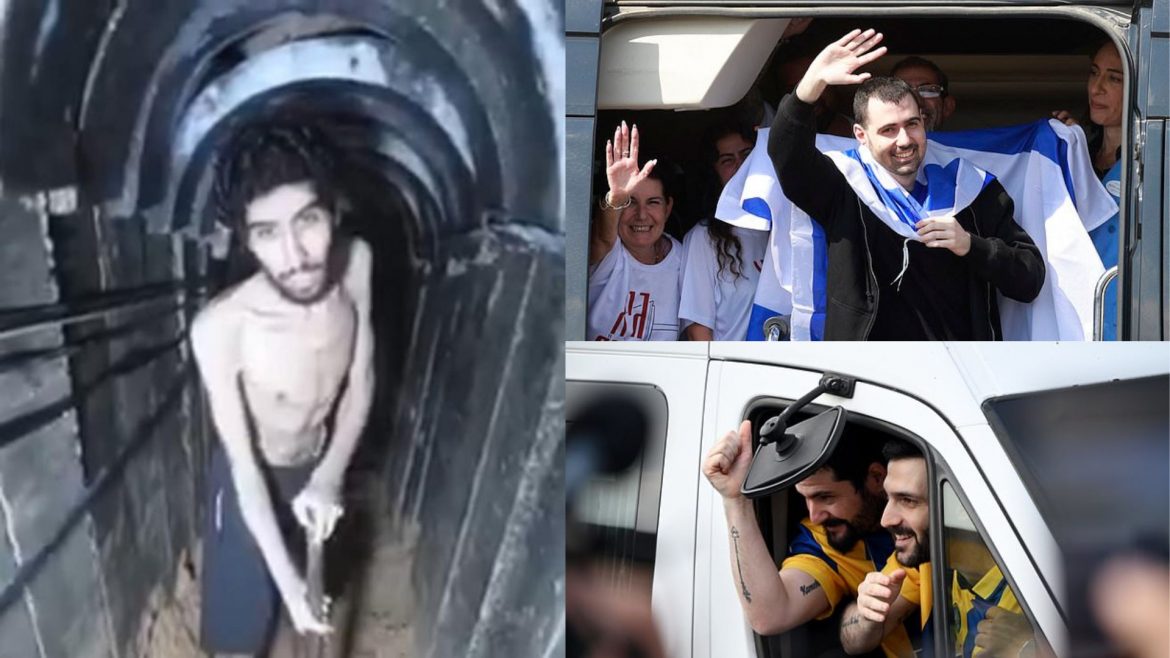After more than two agonizing years of captivity, the final 20 Israeli hostages held by Hamas have finally been freed — a moment marking both relief and heartbreak.
Their return follows a historic Gaza peace deal signed over the weekend, bringing an end to a tragic chapter that began with bloodshed, fear, and unimaginable suffering.
The Nightmare That Began Two Years Ago
It’s been just over two years since Hamas militants stormed into Israel, killing around 1,200 people and abducting 251 others in a violent assault that stunned the world.
While many of those taken were either rescued or found dead over time, the last 20 surviving hostages were handed back only yesterday — frail, traumatized, and forever changed.
Starvation, Isolation, and Cruelty Underground
Those who made it out alive are now revealing horrifying details of their time in captivity.
Many spoke of being starved, isolated, and taunted by their captors, who reportedly ate lavish meals right in front of them.
Some were confined to tunnels beneath Gaza, where daylight never reached and hope seemed out of sight.
Avinatan Or, 32, endured one of the most harrowing ordeals.
Kidnapped alongside his girlfriend, Noa Argamani, from the Nova Festival, he was kept completely alone for nearly two years — unaware of the outside world or even whether Noa was still alive.
By the time he was freed, he had lost nearly 40% of his body weight.
Their reunion yesterday was emotional and tender, a kiss and an embrace after two years of unimaginable separation.
Life in the Shadows: Stories of Other Survivors
Another hostage, 36-year-old Elkana Bohbot, was chained in a dark, damp tunnel for most of his captivity, losing all sense of time.
He somehow remembered his wedding anniversary and pleaded with his captors to let him shower that day — a small victory in the face of dehumanization.
Twins Gali and Ziv Berman, both 28, were held apart, never knowing if the other was still alive.
Though they were confined in the same area, they had no confirmation of each other’s fate until their emotional reunion on Monday.
Both endured long stretches without food, sometimes hearing their captors speak Hebrew as they mocked them.
A Soldier’s Ordeal: Beaten, Lied To, and Isolated
Matan Angrest, who was just 20 when Hamas kidnapped him from his tank, suffered some of the most brutal torture.
His mother, Anat, said her son was beaten until he lost consciousness and was kept in total isolation for months.
Hamas fighters reportedly taunted him, claiming Israel had abandoned its hostages and that they planned another October 7-style attack.
Matan also survived relentless bombardments from above, trapped in tunnels as walls collapsed around him.
Despite being told that his Holocaust-survivor grandparents had died — a cruel lie meant to break him — he remained resilient.
His mother said he’s now in “a reasonable state, at least mentally,” given the torment he faced.
Used as Shields and Shown as Props
Other hostages were subjected to psychological warfare and public humiliation.
Guy Gilboa-Dalal, 24, revealed he was held in tunnels with his childhood friend, Evyatar David, who was later filmed being forced to dig his own grave.
Guy said Hamas began force-feeding them only after outrage over Evyatar’s emaciated appearance spread worldwide.
Evyatar’s parents later learned that he had been used as a human shield during IDF operations, moved from tunnel to tunnel to deter attacks.
Despite the cruelty, his father said Evyatar clung to hope, believing that one day he would be free.
A Long Road Home for Dozens of Families
Among those also freed were hostages Omri Miran, who was shifted between nearly two dozen locations during his two-year ordeal, and childhood friends Ariel Cunio and Rom Braslavski.
Omri’s brother revealed that he even cooked meals for his captors and played cards with them — a grim survival tactic to maintain his sanity.
Cunio only learned days ago that his kidnapped relatives were still alive.
Their reunion marked a rare moment of joy in a story filled with suffering.
The Peace Deal That Changed Everything
The hostages’ release coincides with a sweeping Gaza ceasefire deal that regional leaders — including former U.S. President Donald Trump — hailed as a breakthrough.
Trump made a surprise visit to Israel before flying to Egypt, where he joined leaders from Qatar, Turkey, and Egypt to sign a declaration pledging “comprehensive peace, security, and prosperity” for the region.
Calling it “a tremendous day for the Middle East,” Trump praised Israeli Prime Minister Benjamin Netanyahu and said the agreement “achieved what everybody said was impossible.”
Egyptian President Abdel Fattah al-Sisi called the deal “a closure to a painful chapter in human history.”
Exchange of Prisoners and a Fragile Hope
As part of the agreement, Hamas freed the final 20 surviving hostages in exchange for 1,968 Palestinian prisoners held in Israeli jails.
Both sides framed the swap as a necessary step toward healing, though questions remain about the long-term prospects for peace.
Trump, when asked about the region’s future, said, “We’re talking about rebuilding Gaza. I’m not talking about single state or double state or two state.”
While his words left the specifics vague, the declaration itself emphasized reconstruction and regional cooperation.
A New Dawn or a Temporary Truce?
For many families, this moment represents the end of years of fear and heartbreak.
Yet, amid the relief, there’s unease about what comes next.
The freed hostages now face a different battle — recovering from the deep psychological scars left by captivity.
As Trump declared, “For so many families, it has been years since you’ve known a single day of true peace.”
Whether this peace will last or simply mark another pause in a cycle of violence remains uncertain — but for the first time in years, hope has begun to flicker again across the region.
